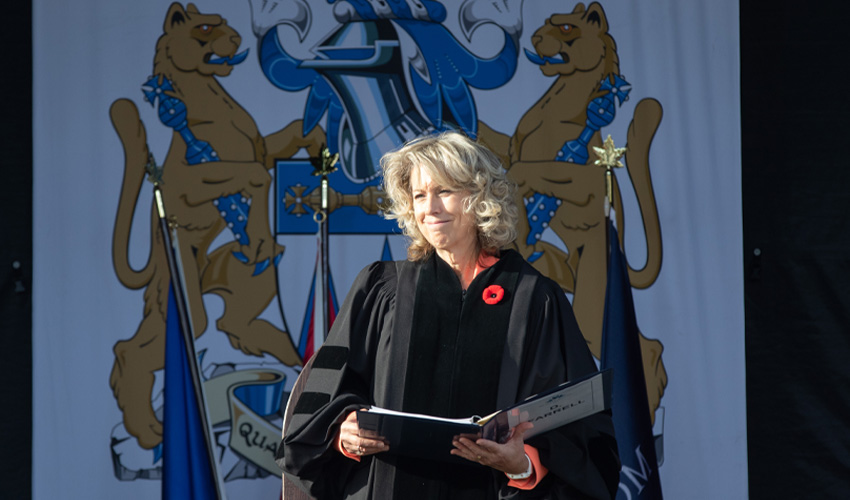Directly to the source
MRU’s chancellor attends classes to hear directly from students
— Mount Royal University | Posted: March 30, 2022

Dawn Farrell was appointed Chancellor of Mount Royal University in July 2020 and was formally installed during Convocation in November 2020.
As the ceremonial head of Mount Royal University, Chancellor Dawn Farrell connects Mount Royal with the community in order to serve a vibrant economy, environment and society. This year, Farrell introduced an informal aspect to her role by attending on-campus classes to converse directly with students.
Dubbed the “Chancellor's Corner,” Farrell is eager to hear about the students’ experiences and their opinions on the state of post-secondary education in Alberta. Farrell’s goal is to listen deeply, and then take the perspectives shared to advocate on behalf of Mount Royal students when meeting with provincial government officials, donors and the Board of Governors.
“The best part of being chancellor is getting to attend classes and experience the University at the root of what it does,” Farrell says.
“Having first-hand experience of what students are learning and how the professors are teaching gives me insights that can help guide the institution over the long run.”
Farrell attended five classes during the months of January and March. On March 17, she participated in a child and youth care counsellor class taught by Assistant Professor Chelan McCallion.
McCallion says her class consists of utilizing a variety of tools in assessing trauma, growth and resilience with characters in novels as the source of study.
“Students are placed into book clubs at the beginning of the semester, read the novel assigned, complete assessment tools throughout the semester and design treatment plans for characters in each book.”
In anticipation of Farrell’s visit, McCallion prepared her students to lead the class. They started with the MRU Indigenous lands acknowledgement, and followed up with a Circle of Courage assement.
The Circle of Courage is an Indigenous practice that considers self-worth using the framework of belonging, mastery, independence and generosity. McCallion teaches from the belief that providing a classroom, which fosters genuine dialogue, will create an environment for deep understanding.
“The students explained the history of the Circle of Courage, the four quadrants (belonging, mastery, independence and generosity), how to complete the activity, and hosted a magical debriefing where they highlighted their insight of practice,” she says.
“It was amazing to see the students teach, support and guide Dawn through the activity.”
McCallion points out that it was interesting to have the chancellor attend and learn about child and youth care counsellor roles.
“We are a rare field. Some would call our field the other 23 hours — as children and youth may have an hour-long appointment with a doctor, dentist or a counsellor, however, we are with them the other 23 hours, within their life space in a variety of roles.”
Farrell also participated in:
- CHEM (chemistry) 3701 – Molecular Mechanics and Dynamics
- SLWK (social work) 1215 – Social Work Assessment and Documentation
- CRJS (criminal justice) 1013 – Diversity Issues and the Criminal Justice System
- HIST (history) 1201 – Why History Matters
“I’ve learned so much,” Farrell says.
“How to count the species in a plot of land when doing an environmental assessment, and how I can use the Circle of Courage to assess my own journey and create actions to strengthen how I connect with the world. I’ve re-learned game theory and math and have evaluated how to differentiate between discrimination and hate crimes. What I’ve really learned is that I still have the capacity to learn and that there is really so much to learn.”
Farrell will share these experiences to drive positive change at MRU.

